Many Cities Say Yes to Federal Police Help, but No to ‘Occupation’

© Alex Kent for The New York Times

© Alex Kent for The New York Times

© Eric Lee for The New York Times

© Sophie Park for The New York Times

© Michael A. McCoy for The New York Times

© Mike Stewart/Associated Press


© FPG/Archive Photos, via Getty Images

© Sodiq Adelakun/Reuters

© Cesar Olmedo/Reuters
菲律宾防长特奥多罗指中国举行抗日战争胜利80周年阅兵式是在试图重塑世界历史后,中国驻菲律宾大使馆批评,相关言论暴露了特奥多罗的傲慢与无知,并呼吁他走出冷战思维,不要成为中菲关系信任赤字的源头。
综合《马尼拉时报》和GMA报道,特奥多罗(Gilberto Teodoro)星期三(9月3日)受访时,质疑中国当天在北京举行的阅兵是在试图重塑世界历史。
他还形容中国国家主席习近平、俄罗斯总统普京,以及朝鲜最高领导人金正恩同台亮相是对小国的“赤裸裸的恐吓”。
中国驻菲律宾使馆星期六(9月6日)在官网以发言人答记者问的形式回应此事时说,特奥多罗并非首次发表反华言论,“有关言论充分暴露了他的傲慢和无知,不尊重事实,不了解历史”。
80年前,中国人民经过14年浴血奋战,以伤亡3500多万人的巨大代价,彻底打败日本军国主义侵略者,宣告世界反法西斯战争的完全胜利。这是中华民族从近代以来陷入深重危机走向伟大复兴的历史转折点,也是世界发展的一个重大转折点。战后确立的国际秩序,中菲两国既是参与者、建设者,也是受益者。中国隆重纪念中国人民抗日战争暨世界反法西斯战争胜利80周年,目的是铭记历史、缅怀先烈、珍爱和平、开创未来。
二战胜利80年后,和平、发展、合作、共赢的时代潮流没有变,但冷战思维、霸权主义、保护主义阴霾不散,新威胁新挑战有增无减,世界进入新的动荡变革期,全球治理走到新的十字路口。为此,中方在上合组织天津峰会上提出全球治理倡议,并愿同各国一道,推动构建更加公正合理的全球治理体系,携手迈向人类命运共同体。这一倡议顺应了各国人民的普遍愿望,符合当今世界的紧迫需求,一经提出就得到与会各国领导人和国际组织负责人的欢迎和支持,也必将得到国际社会更加积极的响应和更加广泛的认同。全球治理倡议五大核心理念,其精神内涵同联合国宪章宗旨和原则一脉相承,有助于各国依托联合国等多边机制,推动全球治理体系与时俱进进行改革与建设,更加有效应对时代挑战。
本次上合组织天津峰会和抗战胜利纪念活动分别有20多位外国国家元首和政府首脑出席,其中约有10位来自东南亚邻国。与会外国领导人一致高度评价两场盛会,并赞赏中国为维护世界和平、推动多边合作所作出的不懈努力。
我们希望这位菲防长能睁眼看世界,走出冷战思维,不要成为中菲关系信任赤字的源头。

路透社报道,船舶追踪数据显示,又一艘从俄罗斯受制裁项目“北极液化天然气2号”运载液化天然气的油轮停靠中国港口。此前几天,俄罗斯总统普京刚刚在北京会见了中国国家主席习近平。
根据伦敦证交所集团(LSEG)的追踪数据,这艘名为 Voskhod LNG 的俄罗斯籍运输船停泊在中国广西铁山港的一个液化天然气接收站。数据显示,该油轮装载有 15万立方米液化天然气,于7月19日在西伯利亚北部吉丹半岛的“北极 LNG 2” 设施装船。
这是该受制裁项目的第二批运输船运抵中国。此前,受制裁的运输船“北极木兰”号已于 8 月底抵达广西北海 LNG 接收站。这是北极液化天然气项目自去年投产以来的首次发货运抵终端客户。
路透社尚未能确认这批液化天然气是否已在铁山港卸货,拨打港口电话也未能接通。
北极液化天然气项目于投产以来,由于缺乏破冰液化天然气运输船以及因俄乌战争而受到西方制裁,导致供货进度落后于计划。
此次运输抵达中国港,正值普京高调访华,出席上合组织峰会及中国九三阅兵数日。
北极 LNG 2 项目由俄罗斯 诺瓦泰克公司(Novatek,持股 60%) 主导,原计划建成为俄罗斯最大液化天然气工厂之一,目标年产能1980万吨,但制裁已为其前景蒙上阴影。
数据显示,去年该项目共有 8 批液化天然气装船,由多艘受制裁的油轮运输,其中 4 批货物被卸入科里亚克浮式储存装置(FSU)。今年迄今,该项目已装运 6 批 ,部分受制裁油船沿北方海航道向东航行。根据船舶追踪数据,目前两艘油轮停靠在俄罗斯远东的堪察加半岛,另有一艘位于台湾和海南岛之间的南海海域。

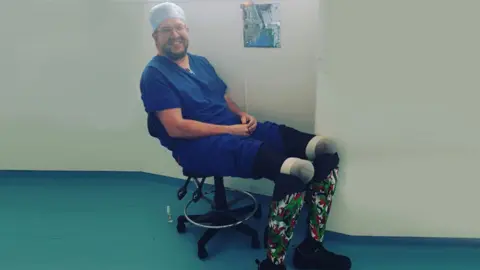 Instagram/Bionicsurgeon
Instagram/BionicsurgeonWhen I interviewed surgeon Neil Hopper in 2023 for BBC News, I believed I was speaking to a man who had been humbled by the life-changing experience of losing his legs to sepsis.
Little did I know, Hopper had a sexual interest in amputation and had frozen his own legs so they would be removed.
Hopper, a consultant vascular surgeon who had carried out hundreds of amputation operations, told me he had come down with a mystery illness on a family camping trip which had led to sepsis and below-knee amputations of both his legs.
In reality, he had used ice and dry ice to freeze his own legs, causing damage that meant they eventually had to be amputated in hospital.
Watching him being jailed on Thursday it was hard to reconcile the reflective man I had interviewed in my capacity as a journalist, with the often graphic details heard in court.
When I interviewed him, I had not doubted the version of events he had told me for one moment. He was a respected surgeon, and why would anyone lie about such a thing?
Warning: Contains information some readers may find upsetting

 Instagram/Bionicsurgeon
Instagram/BionicsurgeonBack in 2023 Hopper, who grew up in Aberystwyth and Swansea and was living in Truro, Cornwall, appeared almost grateful for the opportunity his life-changing surgery had given him to reassess his life.
"You have to make a lot of sacrifices to be a surgeon and family time is one of them," the father-of-two told me. "I know that was a mistake."
He seemed relaxed, at peace, like a man who had gone through something horrific but had come out the other side changed for the better.
He said losing his legs had led him to "audit" his life and try new things, including applying to become Nasa's first disabled astronaut.
He told me he passed the medical and made it to the final 27 applicants but the space agency eventually selected Paralympic sprinter John McFall.
"My life is more interesting because of what's happened to me," he insisted.
He also praised his wife.
"This didn't happen to me, it happened to us," he said.

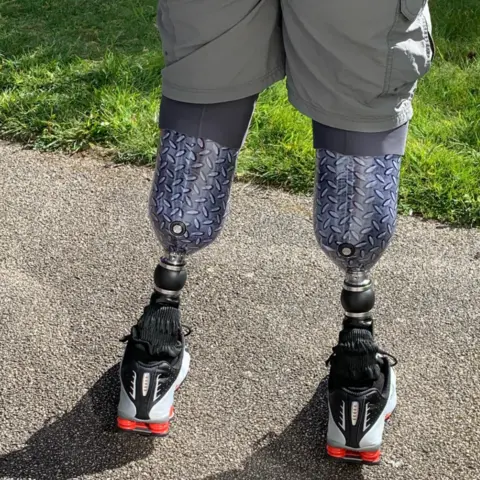 Instagram/Bionicsurgeon
Instagram/BionicsurgeonThe truth behind his amputations was finally laid bare in court on Thursday.
Having his legs amputated was a long-standing ambition for Hopper, the court was told. He had both an obsession and a sexual interest in removing parts of his own body.
The court heard how he had suffered body dysphoria since childhood and his feet were an "unwelcome extra" and a "persisting never-ending discomfort".
For some time, Hopper had been paying to access videos of body mutilation.
The court heard he had bought three videos from the website for £10 and £35, respectively, showing men willingly having their genitals removed.
He also exchanged about 1,500 messages with Marius Gustavson, an amputee who ran the website.
Some of the messages were Hopper seeking advice from Gustavson about how he had brought about his own lower leg amputation.
In one message Hopper told Gustavson: "I've dreamt of this for 20 years."
In another he wrote: "It's going to be awesome being a double amputee."
After his amputations he sent him another message: "It feels so cool. No feet!"

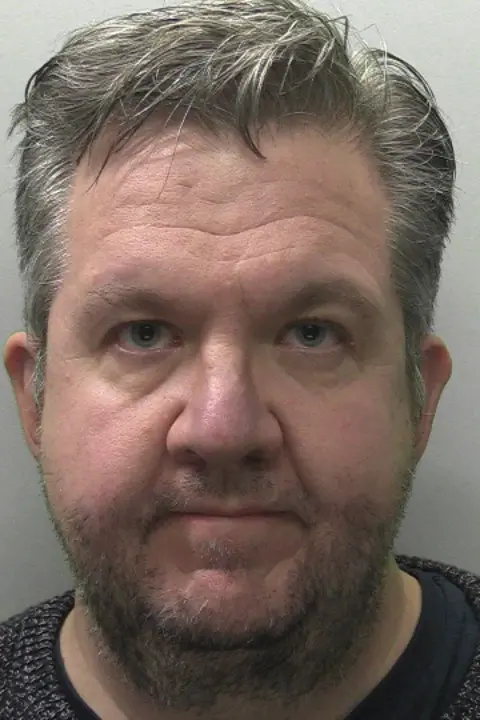 Devon and Cornwall Police
Devon and Cornwall PoliceHopper returned to work for the Royal Cornwall Hospitals NHS Trust just six months after his amputations.
He went on to make fraudulent claims from two insurance firms, lying that the injuries to his legs were the result of sepsis and not self-inflicted.
During this time he messaged a friend to say he felt he should "milk this as much as possible".
The money - totalling more than £466,000 - was quickly spent on luxury items including home improvements, a campervan and a hot tub.
Hopper's unique insight as an amputee who carried out amputation operations, as well as his bid to go into space garnered plenty of media attention.
"He enjoyed the attention that this generated," the court was told.

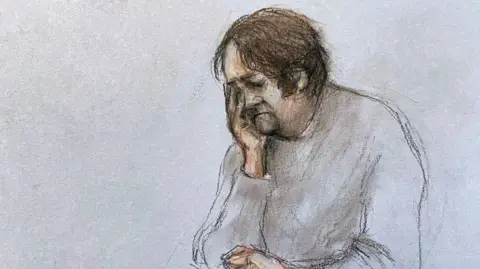 Elizabeth Cook/PA Wire
Elizabeth Cook/PA WireIt was the police investigation into Gustavson that would be Hopper's undoing.
Gustavson was jailed for life in 2024 for leading an extreme body modification ring.
Hopper was arrested in March 2023 and has been suspended from the medical register since December 2023.
On Thursday he was jailed for two years and eight months for insurance fraud and possessing extreme pornography. The court heard Hopper did not regret the operations, but "bitterly regrets" the "dishonesty" about their cause.

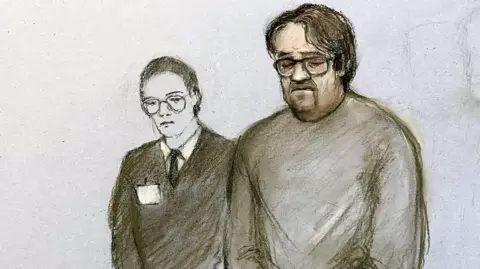 Elizabeth Cook/PA Wire
Elizabeth Cook/PA WireWhen news of the charges against Hopper broke in July, I was shocked.
Then I was confused - what exactly was he accused of doing? And why would someone inflict those injuries on themself?
Then I was concerned. Was I wrong to have taken what he told me at face value?
Fact-checking is an essential part of journalism, but on the face of it this did not appear to be a difficult story to confirm.
I was communicating with Hopper through his place of work, his work as a surgeon was well-documented, and his bilateral amputations were plain to see.
In court Hopper's case was described as "very unique", a "saga" and "difficult to comprehend".
He had managed to pull the wool over the eyes of medics, two insurance companies, and those who knew him - who expressed shock in character references read to the court.
Remembering my conversation with Hopper while watching his sentencing on Thursday, it was clear that as a journalist you never quite know where a story will take you.

 Marianna Massey/Getty Images
Marianna Massey/Getty ImagesLike many Australians, Rach grew up "terrified of the sun" in a country that has the unenviable title of skin cancer capital of the world.
Her childhood was characterised by the infamous "no hat, no play" rule that is commonplace in Australian schools, 90s advertisements that warned the sun would give you cancer, and sunscreen tubes that stood guard at every door in her home.
It made the now 34-year-old the kind of person who religiously applies sunscreen multiple times a day and rarely leaves the house without a hat.
So she was shocked when doctors found a skin cancer on her nose during a check last November, something they said was abnormal given her age and ray-dodging regime.
Though technically classified as a "low grade" skin cancer – a basel cell carcinoma – it had to be surgically removed, leaving the Newcastle mum with a scar just below her eye.
"I was just confused, and I was a little bit angry because I was like, 'Are you kidding me?'" Rach – who asked that her surname not be used – told the BBC. "I thought I'd done all the right stuff and it still happened to me."
That rage grew when she learned the sunscreen she had been using for years was unreliable and, according to some tests, offered next to no sun protection at all.

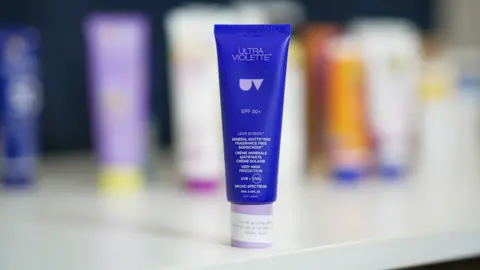 ABC News/Billy Cooper
ABC News/Billy CooperIndependent analysis by a trusted consumer advocacy group has found that several of Australia's most popular, and expensive, sunscreens are not providing the protection they claim to, kicking off a national scandal.
There has been a massive backlash from customers, a probe launched by the country's medical watchdog, multiple products pulled from shelves, and questions raised about the regulation of sunscreen around the globe.
"It's definitely not an issue isolated to Australia," cosmetic chemist Michelle Wong told the BBC.
Australians have a complicated relationship with the sun: they love it, but they also fear it.
Effective public health messaging – which has drilled "Slip, Slop, Slap" into their heads – competes with a beauty culture which often idolises bronzed skin.
The country has the highest incidence of skin cancers in the world and it is estimated that two out of three Australians will have at least one cut out in their lifetime.
So when Choice Australia released its damning report in June, it immediately made waves. The group had tested 20 sunscreens in an independent accredited Australian lab, finding 16 did not meet the SPF, or skin protection factor, rating listed on the packet.
Ultra Violette's Lean Screen SPF 50+ Mattifying Zinc Skinscreen, a facial product that Rach says she used exclusively, was the "most significant failure" identified. It returned a result of SPF 4, something that shocked Choice so much it commissioned a second test that produced a similar reading.
Other products that did not meet their SPF claims included those from Neutrogena, Banana Boat, Bondi Sands and the Cancer Council - but they all rejected Choice's findings and said their own independent testing showed their sunscreens worked as advertised.

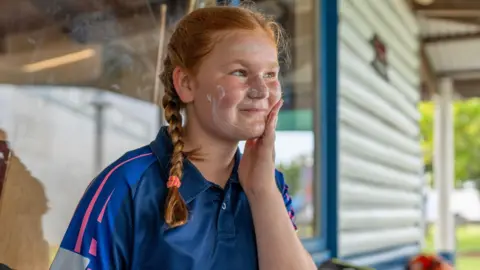 Getty Images
Getty ImagesThe uproar was immediate for the brands named in the report, and also prompted a swift response from the Therapeutic Goods Association (TGA), which said it would investigate the findings and "take regulatory action as required".
Ultra Violette bit back, saying they were "confident that Lean Screen is safe and effective" and detailing extensive testing of the product – which has been sold in almost 30 countries, including the UK, and retails for upwards of A$50 (£24, $33).
But less than two months later, it announced that Lean Screen would be recalled after it returned inconsistent results across eight different sets of lab testing.
"We are deeply sorry that one of our products has fallen short of the standards we pride ourselves on and that you have come to expect of us," read a statement published to the brand's Instagram account.
It added that it has "since ended the relationship with the initial testing lab".
In the past fortnight, other brands have "paused" the sale of at least four more products, none of which were included in the Choice report.
Rach knows there is no way to prove that there is a link between her diagnosis and the brand of sunscreen she relied on. She says she is not alleging there is such a connection.
But she said Ultra Violette's response to the scandal was like "a kick in the guts".
She felt that they took no real accountability for the pitfalls of their product, and was let down by their decision to continue selling it for two months despite doubts over its efficacy.
"I just had like the five stages of grief, you know?" she said. "I was angry, I was upset, I was almost in denial."

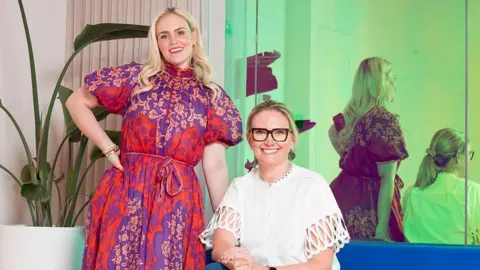 Getty Images
Getty ImagesLike Rach, a horde of annoyed customers say the saga has shaken their faith in the industry.
"A refund isn't really going to reverse years of sun damage, is it?" one wrote in response to Ultra Violette's recall statement.
Choice has urged the TGA to conduct further investigations into the sunscreen market, and also urged any brands who had reason to question the SPF protection listed on their products to remove them from sale immediately.
"It is clear there is a serious issue in the Australian sunscreen industry that urgently needs to be addressed," said Rosie Thomas, the director of campaigns, in a statement to the BBC.
While in Europe sunscreen is classed as a cosmetic, Australia regulates it as a therapeutic good – essentially a medicine – which means it is subject to some of the most robust sunscreen regulations in the world.
And that's something many of the brands caught up in this saga trade on. So, how did this happen?
An investigation by the Australian Broadcasting Corporation found that a single US-based laboratory had certified at least half of the products that had failed Choice's testing, and that this facility routinely recorded high test results.
It also found that several of the sunscreens pulled from shelves shared a similar base formula and linked them to a manufacturer in Western Australia.
The TGA says it does not usually speak about ongoing investigations because it does not want to compromise them, but that it is also looking into "reviewing existing SPF testing requirements" which can be "highly subjective".
"The TGA is also aware that it is common practice for different sunscreen products to share the same or similar base formulations," a spokesperson said in a statement to the BBC.
"Ultimately it is the sponsor's [seller's] responsibility to ensure that their medicine remains compliant with all applicable legislative requirements."
Consistent and comfortable sunscreens which offer high protection are very technical and difficult to make, says Dr Wong, founder of Lab Muffin Beauty Science.
Everyone's skin responds differently to the product, he adds, and it's one that is almost always being stress-tested – by sweat, water, or makeup.
It is very difficult to rate effectively for the same reasons. Historically, it has been done by spreading the sunscreen on 10 people at the same thickness, then timing how long it takes for their skin to start burning both with and without the product applied.

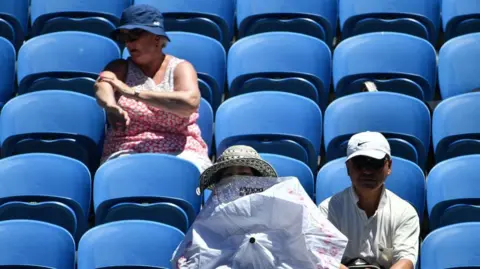 Getty Images
Getty ImagesWhile there are clear guidelines as to what you are looking for, Dr Wong says there is still a lot of variability. That is down to skin texture or tone, or even the colour of the walls, and "different labs get different results".
But she says results are also quite easy to fake, pointing to a 2019 probe by US authorities into a sunscreen testing laboratory which resulted in the owner being jailed for fraud.
Many sunscreen brands from all over the world use the same manufacturers and testing labs - and so this issue is unlikely to be isolated to Australia, she adds.
"Until someone goes out and tests a whole bunch of sunscreens in other countries, we just don't know the extent of it."
She says the scandal is a reminder that regulations are only as good as they are enforced.
But while it has touched a nerve for many people who are at high risk for skin cancer simply by virtue of being Australian, Dr Wong said she felt the panic triggered by the investigation was blown out of proportion.
She points to the world's largest clinical trial of sunscreen, done in the 90s, which found that the daily use of an SPF 16 sunscreen dramatically dropped skin cancer rates.
"95% of the sunscreens tested [by Choice] have high enough SPF to more than half the incidence of skin cancer," Dr Wong said.
"Some of the SPF testing, I feel, has become a bit more of a marketing exercise than a real reflection of efficacy."
The most important thing you can do when choosing a sunscreen, she says, is actually wear enough of it – a full teaspoon at least for each part of your body, face included.
And ideally you should apply it about every two hours, especially if you have been sweating a lot or swimming.
Experts also advise that you combine the sunscreen with other safety methods, such as wearing protective clothing and seeking out shade.

Olivia Smith has already made history.
The 21-year-old has a legacy before she steps out in front of Emirates Stadium's crowd for the first time on Saturday as the first £1m women's footballer.
Arsenal broke the world record to sign her from Liverpool in July and, although it has since been surpassed, she will forever be the women's game's first seven-figure player.
"Everything was leading to this. She was born for this," her former Penn State University head coach Erica Dambach told BBC Sport.
"Yes, it's happened young, but it hasn't happened without years of preparation to get into this environment.
"Sometimes when it happens to young players, it comes on quickly and maybe they've got six months to deal with the emotions and the media training. Liv has been experiencing this stuff since she was 15 years old."
It was at that age she made her debut for Canada - the youngest player to appear for Les Rogues - so the scrutiny and bubbling pressure that will come after signing for the European champions will not be an alien experience for Smith.
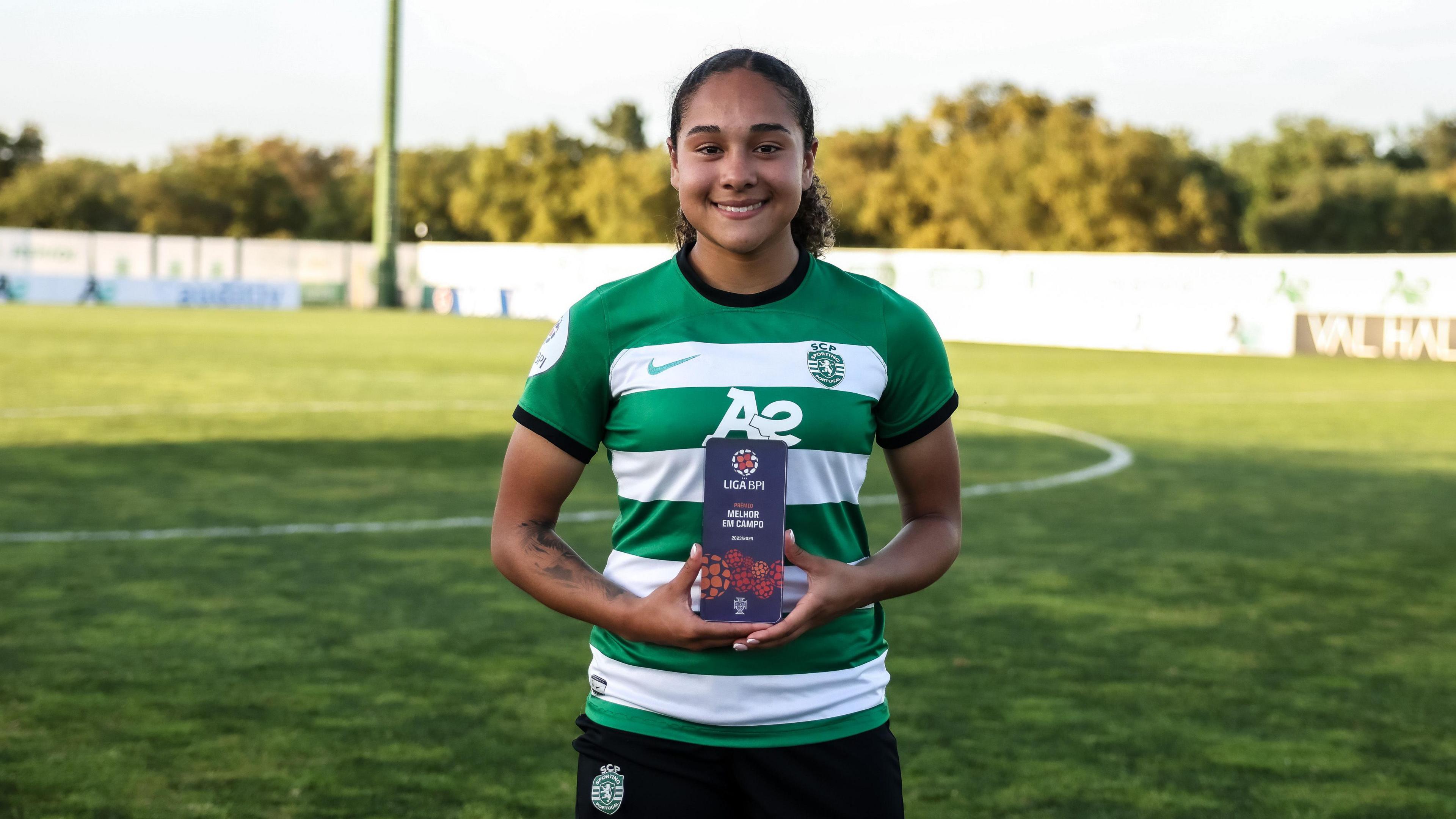
Smith, who only turned professional in 2023, joined Liverpool from Portuguese side Sporting a year ago for a club record fee of just over £200,000
Despite her meteoric rise, her former coaches say she has not changed.
When Liverpool were on the verge of breaking their transfer record - with Smith arriving on Merseyside to complete her medical in a £210,000 deal from Portuguese side Sporting - then-manager Matt Beard met his new prodigious signing in person for the first time over dinner.
"I like to get to know people as people rather than footballers, because I know the footballer that we signed, and we had a lot in common, it was surreal," Beard told BBC Sport.
"She's just a great kid, she's very down to earth. But we just hit it off really well. She's great, and the thing with Olivia is she just takes everything in her stride.
"She's a kid at heart. She's human and I think from my perspective I tried to allow everyone to be themselves and she settled in really quickly. That's just how her personality is."
The relationship that built between player and coach was deep and, even after both departed Liverpool, they stayed in touch. Smith called Beard to thank him after her new club Arsenal's pre-season game against Tottenham Hotspur.
This is a common trait of the Canadian. Smith texted Sporting's head of women's football, Margarida Batlle y Font, after her move to Arsenal and also visited AFC Toronto this summer to meet Marko Milanovic and Billy Wilson, two people who played an instrumental part in her development when they were all at North Toronto Nitros.
"The best thing about Olivia is she's still just Liv," Wilson told BBC Sport. "She's not changed at all. She's still got the exact same group of friends.
"She's just a kid who loves to love life, has a great outlook, loves her football, is always smiling.
"She's not changed a bit and I think that's the biggest testament to who she is. None of this has fazed her."
Her parents have played a vital part in their daughter's impressive rise and have been there to support her along every step.
Sean Smith and Sulee Riquelme-Smith were also at that dinner table in Liverpool - along with the forward, Beard and Russ Fraser, Liverpool's former women's managing director - and that will hardly surprise anyone who has followed the player's career.
"The mum and dad have done an unbelievable job in preparing her for this," said Beard. "They've made a lot of sacrifices as a family.
"They have done a fantastic job raising her and preparing her for this moment as an athlete."
As a child, her passion was always football. Her parents encouraged her to follow her other interests, which have in turned helped her grow as a footballer.
"She played numerous sports such as hockey, and she did a martial arts discipline," said Beard.
"I just think that education alone, if you are looking at martial arts as a sport, it's more about discipline and it's not about the fighting side of it… that's obviously benefited her.
"Smith has - which I never, ever want to take out of players, and you saw it a few times [last season] - a frustration. And I think the top players are like that. So you don't want to take that out."
Batlle y Font also got to experience the big role that Sean played in his daughter's career on the day Smith signed for Sporting, her first move to Europe.
"Her dad is a figure a bit like the father of Venus and Serena Williams," said Sporting's head of women's football.
"He was that kind of mentor to her when she was young and still keeps being on her side. He was very proud of Olivia."
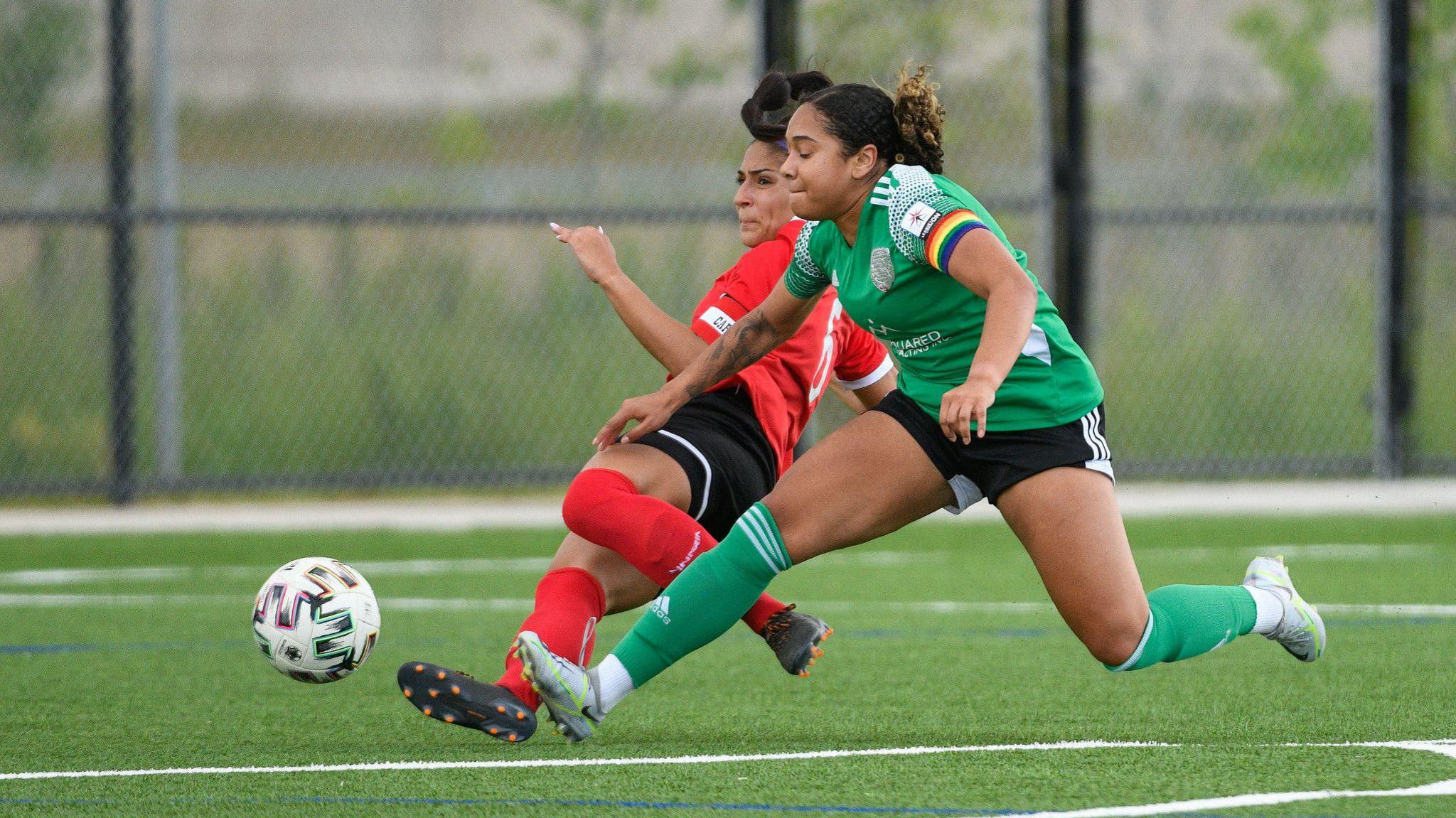
Olivia Smith won the golden boot in her debut campaign with Toronto Nitros
In 2022 Smith was playing at North Toronto Nitros. She ripped League1 Ontario up.
By the time the semi-professional league came to an end, she had scored 18 goals in 11 games and it would be the last time playing club football in her home country.
That summer she moved south of the border, to Penn State University in Pennsylvania. Again, her time there was fleeting.
Despite arriving at Penn State with a serious cruciate ligament injury, sustained at the Under-20 World Cup, and a frail run of form, the calls from Europe arrived by the end of her freshman year.
"It was neat to watch her be able to be an 18-year-old because I don't think there's been a lot of times where she's been able to be her actual age," said former Penn State University head coach Dambach.
"Since leaving Penn State she has put herself out there and put herself in uncomfortable situations and I think through those she was able to really grow and develop."
And so, one year on from that season in Canada, she had left college and moved to Portugal to join Sporting, despite heavy interest in France and England.
Batlle y Font was instrumental in persuading Smith to move to the relatively obscure Portuguese league - and reaped the rewards.
"I won't say that our project is better than those clubs, obviously it's different," said the 30-year-old. "I think she understood that we really wanted her.
"I think that she chose us because she understood that she would have the same rights and same duties as other players, but she would not be one more player.
"Once she made the decision, we never felt that she was looking at us as a minor club, compared to the other clubs interested in her."
It did not take her long to make an impression in Portugal.
"She was 18 and she was playing against experienced players and she would make a bit of a fool of them.
"When she played we would look at each other and say, 'how did we fool this girl to be here? How lucky are we?'"
Again by the end of another fruitful season, she was packing her bags and Batlle y Font was receiving enquiries from multiple clubs in Europe.
"There were more clubs interested and, to be honest, with better offers than Liverpool, but not the kind of project that Olivia wanted," said Batlle Y Font. "Once again, this shows how very grounded Olivia is."
Her debut season in the WSL saw her score seven goals in 20 games for Liverpool, as well as being named the PFA young player of the year. When she arrived at Arsenal this summer, it was her third club in three years.
"I definitely think it's not comfortable, but you have to be comfortable being uncomfortable," said Smith, speaking to reporters in pre-season. "And it's been quite tough for me personally, not knowing what's going to come next.
"Like my first season, I never expected to leave after one season, especially last season, only having one season in what I think is the best league in the world and then coming here.
"So it's certainly not easy, especially with my family so far away, but it does make transitions easier."
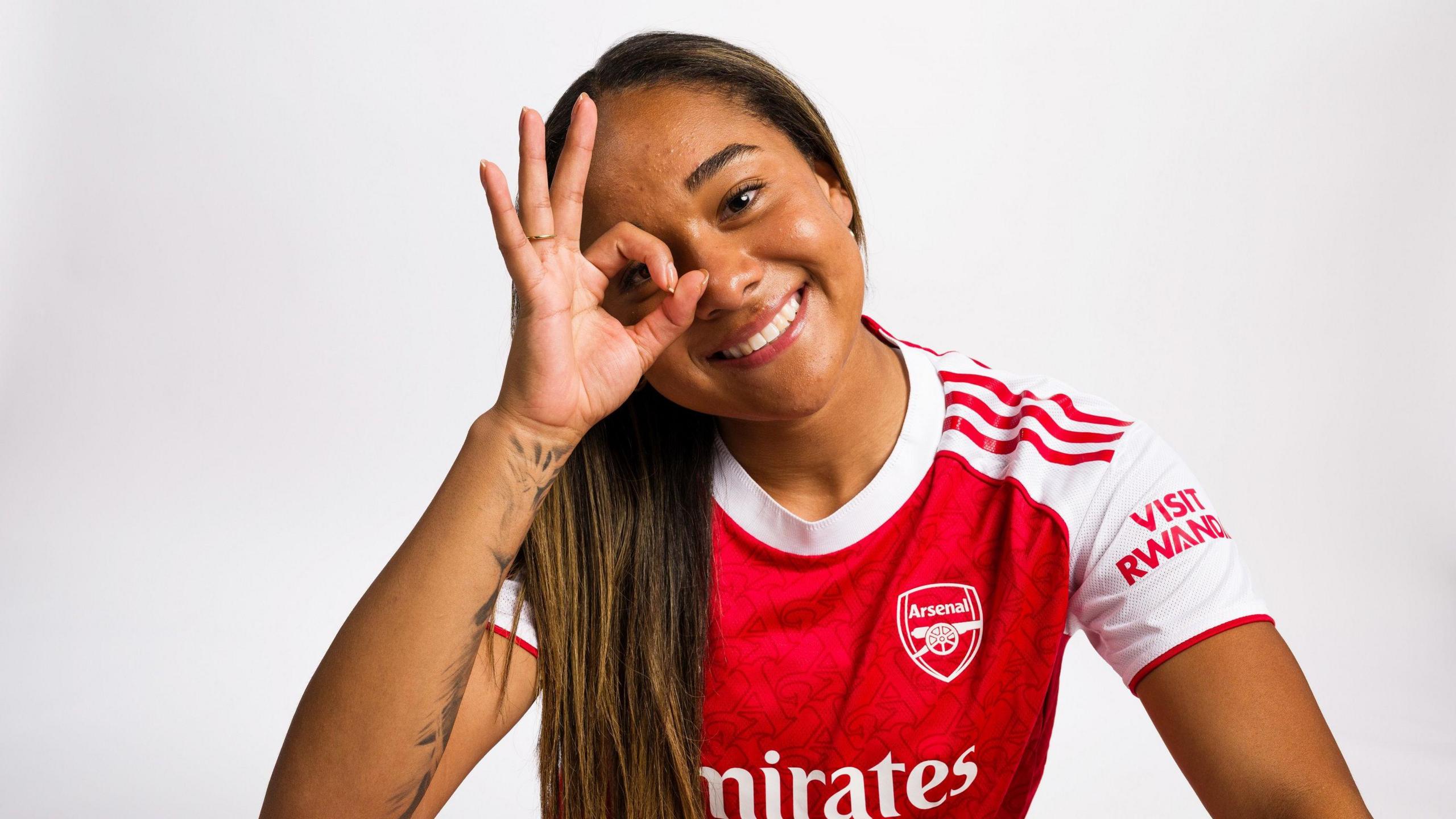
Olivia Smith's world record fee has since been eclipsed by Lizbeth Ovalle, who joined Orlando Pride from Tigres for £1.1m
This summer has shown the rapid growth of the women's game. Smith's world record transfer lasted 35 days, with Orlando Pride signing Lizbeth Ovalle for £1.1m from Tigres.
But Smith will always be the player who was the first to breach the seven-figure mark, like Trevor Francis in the men's game in 1979, and that comes with its own, unique pressure.
"It's definitely an honour, especially coming from Liverpool," said Arsenal's new forward.
"To come with, obviously, such a hefty price tag for such a young player like me, I think they see the potential that I have, and they see my mindset.
"I'm hungry, I'm driven, I want to learn, I want to grow, and I want to win things, ultimately.
"And I think that was a big piece. But with the money, it's not really a big deal for me."
For those who have worked with her, they believe this money will be justified with her performances on the pitch and that she will use the price tag as motivation.
"She just had everything at that age," said Beard. "For me, she's going to be the best player in the world without a shadow of a doubt."
Wilson added: "It's an amazing mentality and some players when they get there, they stay on that limit. She is always trying to overcome limits. It's hard to be consistent and she is consistent."
And for Arsenal, they should have the luxury that Penn State, Sporting and Liverpool were not able to have - more than a year with Smith in their side.
"We knew that she would be [at Sporting] a short time and now Arsenal know that they can have her for quite a while because she's reached the top of European football," said Batlle y Font.
"I have no doubt that even though she's just got to the Champions League winners, she will keep pushing.
"She's very humble, she's quiet and she's a sweet girl. On the pitch, she's a lion."
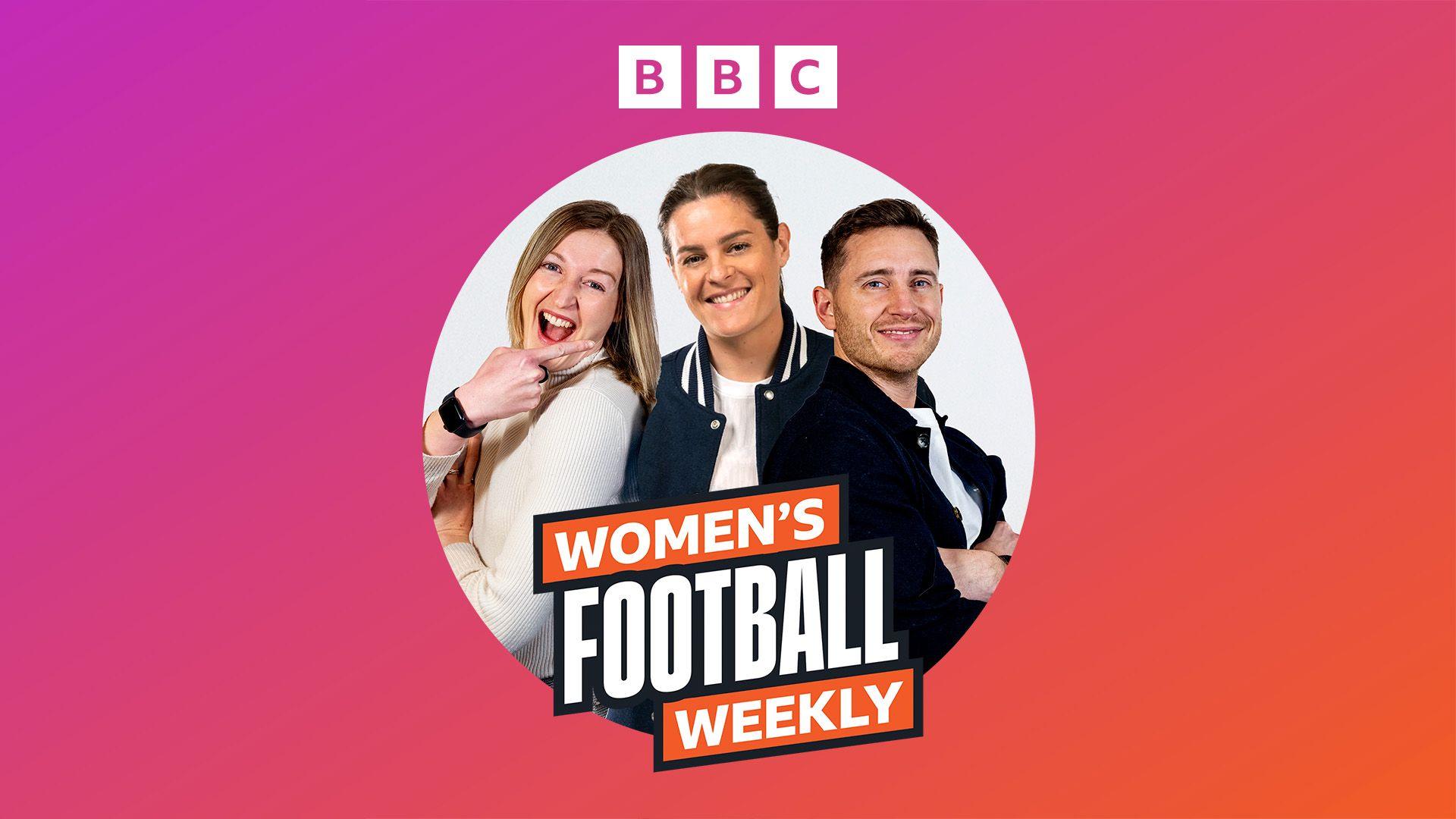
Ben Haines, Ellen White and Jen Beattie are back for another season of the Women's Football Weekly podcast. New episodes drop every Tuesday on BBC Sounds, plus find interviews and extra content from the Women's Super League and beyond on the Women's Football Weekly feed

 NATALIA KOLESNIKOVA/AFP via Getty Images
NATALIA KOLESNIKOVA/AFP via Getty ImagesMarina, a 45-year-old freelance copywriter, has relied on WhatsApp for her work and personal life for years.
But one day last month that abruptly changed when a call to a colleague did not go through properly. They tried Telegram - another messaging app popular in Russia - but that did not work either.
She was one of millions of Russians facing new restrictions imposed in mid-August by Russia's media regulator, Roskomnadzor, on calls made through the two platforms - the country's most popular apps.
The timing coincides with the rollout of a new "national messenger" app known as Max and created by a Russian firm closely controlled by the Kremlin.
Monthly user numbers of WhatsApp and Telegram are estimated to be 97 and 90 million respectively — in a country of 143 million people.
From parents' chats to tenants' groups, much of daily life runs through them. WhatsApp - whose owner, Meta, is designated an extremist organisation in Russia - is especially popular with older people because of how easy it is to register and use.

 AFP via Getty Images
AFP via Getty ImagesIn some parts of Russia, particularly in remote and sparsely connected places in the Far East, WhatsApp is much more than chatting with friends and colleagues. Mobile browsing is sometimes painfully slow, so people use the app to coordinate local matters, order taxis, buy alcohol, and share news.
Both apps offer end-to-end encryption which means that no third party, not even those who own them, are able to read messages or listen to calls.
Officials say the apps refused to store Russian users' data in the country, as required by law, and they have claimed scammers exploit messaging apps. Yet Central Bank figures show most scams still happen over regular mobile networks.
Telecom experts and many Russians see the crackdown as the government trying to keep an eye on who people talk to and potentially what they say.
"The authorities don't want us, ordinary people, to maintain any kind of relationships, connections, friendships or mutual support. They want everyone to sit quietly in their own corner," says Marina who lives in Tula, a city 180km (110 miles) south of Moscow.
She asked us to change her name, worrying that speaking to foreign media can be dangerous.
The new Max app is being aggressively promoted by pop stars and bloggers, and since 1 September all devices sold in Russia must have Max pre-installed.
It was launched by VK, which owns the country's largest social network of the same name. The Facebook-like platform is controlled by oil-and-gas giant Gazprom and one of Vladimir Putin's closest confidantes, billionaire Yuri Kovalchuk.
Max is set to become a super-app, bringing together multiple functions, including government digital services and banking.
The model mirrors China's WeChat - central to daily life but also a tool of censorship and surveillance.
Max's privacy policy states it can pass information to third parties and government bodies, potentially giving access to the security services or making user data vulnerable to leaks.
In Russia, where people are prosecuted for critical comments or private messages, and a black market of personal data feeds an epidemic of scam calls, this is a real concern.
Although many Russians are worried about the new restrictions on WhatsApp and Telegram, and by the introduction of Max, the state already has vast means to spy on its citizens.

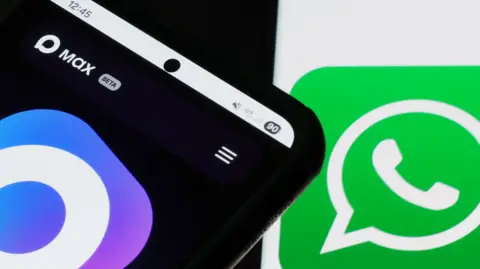 Getty Images
Getty ImagesBy law, you can only buy a sim card with your national ID, and the security services have access to telecom operators' infrastructure. This means they can find out who you call as well as your whereabouts.
From this month it is now illegal to share your sim card with anyone other than a close relative.
But Max can potentially allow the authorities to read your messages as well - and avoiding the app is getting harder.

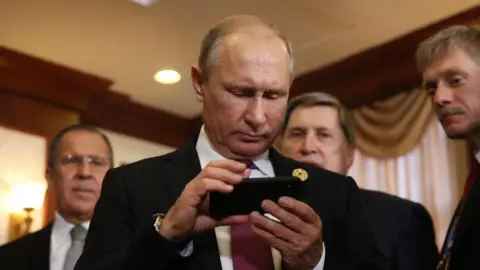 Mikhail Svetlov/Getty Images
Mikhail Svetlov/Getty ImagesSchools are now obliged to move parent chats to the app.
In Rostov region, which borders Ukraine, Max is being adopted as an alert system; in St Petersburg, it is being tied to emergency services.
Despite the push, Max remains far behind its rivals - this week it claimed to have 30 million users.
The Kremlin has long been uneasy of the freedoms offered to people by the internet, which Vladimir Putin once called a CIA project.
The first legislative restrictions came in 2012, soon after mass opposition protests, officially to protect children from suicide-related content.
Ten years later, when Russia launched its full-scale invasion of Ukraine, the government blocked popular social media sites, such as Facebook, Instagram and X, and most independent media, leaving them accessible only through VPNs.
New restrictions keep coming: as of this month, Russians face fines for "deliberately searching" online for extremist materials - more than 5,000 resources from an ever-growing blacklist compiled by the ministry of justice. Examples include a book by opposition leader Alexei Navalny, who died in prison in 2024, and Ukrainian songs.
Another ban targets adverts on platforms linked to "extremist" organisations, in effect ending advertising on Instagram which many small businesses had relied on as a shopfront.
Ads for VPNs are also banned, and while using these apps is not illegal, it may now be treated as an aggravating factor in criminal cases.
Apart from their problems with WhatsApp and Telegram, many Russians are now getting used to life without mobile internet altogether, as entire cities face regular cut-offs.
Since May, every Russian region has seen mobile internet go down.
Blackouts surged through the summer, with up to 77 regions hit by shutdowns simultaneously at the peak, according to the Na Svyazi (In Touch) project.
The authorities justify the measures by the need to protect people and infrastructure from attacks by Ukrainian drones - Kyiv's response to Russia's relentless and deadly bombardments of Ukrainian cities.
But some experts doubt that switching off mobile internet - which many Russians use instead of broadband - is an effective tool against long-distance drone attacks.
Local authorities, who were made responsible for countering drone attacks, have no other means to do it, explains telecom expert Mikhail Klimarev.
"There are no air defence systems, no army - everything's on the frontline," he says. "Their logic goes: we've switched off the internet and there were no drones, hence it works."
In Vladimir, 200km (125 miles) east of Moscow, two of the city's three districts have been offline for almost a month.
"It's impossible to check bus routes or timetables," says Konstantin, a resident who also asked to change his name. "The information boards at stops also show errors."
Taxi fares have risen as drivers cannot accept orders online.
State TV in Vladimir spun the shutdown as "digital detox", showing residents who said they now enjoyed more walking, reading and spending time with friends.
In Krasnoyarsk, a city of more than a million people in Siberia, mobile internet vanished citywide for three days in July and still works poorly.
Some officials rejected complaints, with one Krasnoyarsk bureaucrat suggesting remote workers who lost income should "go and work for the special military operation", as the war in Ukraine is known in Russia. She later apologised.
The government is now working on a scheme that will allow Russians to access only vital online services during shutdowns, such as banking, taxis, deliveries - and the Max messenger.
This is a dangerous step, warns Sarkis Darbinyan, lawyer and co-founder of digital rights group RKS Global.
"There's a possibility the authorities will use this measure for other goals apart from fighting drones," he tells the BBC.
He believes the Kremlin's current approach to the internet mirrors Beijing's.
"Unlike the Chinese, Russians have spent decades enjoying cheap, fast internet and foreign platforms," he says. "These services became deeply ingrained not only in people's daily lives but also in business processes."
For now those who are wary of installing Max on their devices can still find a way around it.
Marina from Tula says her mother, a school teacher, was instructed to download the messenger but claimed to her superiors that she didn't have a smartphone.
People can still call each other using regular mobile networks, although that is more expensive, especially when talking to someone abroad - and not secure.
There are other means available too, like using VPNs or alternative messaging apps, previously reserved for tech nerds and those handling sensitive information.
But as government control over the internet increases, fewer and fewer people will find ways to escape it - and that is assuming the internet is still available for them to try.
Additional reporting by Yaroslava Kiryukhina

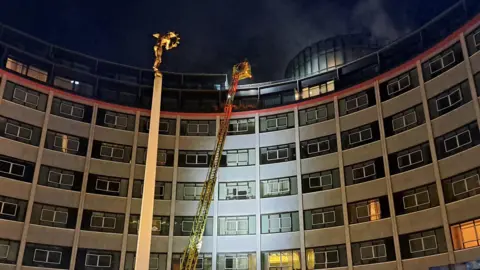 London Fire Brigade
London Fire BrigadeAbout 100 firefighters are tackling a blaze at the BBC's former headquarters, Television Centre, in west London.
London Fire Brigade said 15 engines were at the nine-storey building on Wood Lane, White City, after a fire broke out in the early hours of Saturday morning.
The building is now home to a restaurant and flats, as well as television studios. Authorities said an unspecified number of homes were affected and people had been evacuated.
It is not known what caused the fire or whether there have been any injuries.
London Fire Brigade said it was called out 03:08 BST, with crews drafted in from Hammersmith, North Kensington, Kensington and Chiswick.
Two large turntable ladders were being used to tackle the fire from a height.
"The Brigade is working alongside multi-agency partners, including the Metropolitan Police, to evacuate buildings in the area as a precaution," it said in a statement.
"A rest centre is being set up for residents who have been evacuated from their homes.
"Wood Lane is currently closed to traffic and people are advised to avoid the area as the incident will remain ongoing for some time."
香港政务司长陈国基说,过去几十年香港禁毒工作显著见效,吸毒人数较70年代末减少逾七成,并呼吁继续努力实现“无毒城市”的目标。
据港府新闻公报,陈国基星期五(9月5日)在粤港澳大湾区禁毒高峰会上致辞说,一直以来,港府都以多管齐下的策略应对毒品问题,不仅从源头堵截、强化执法和加强宣传教育入手,全面打击毒品危害,也为吸毒人士提供戒毒治疗与康复服务,协助他们重返社会、重拾健康人生。
他提到,过去几十年,香港禁毒工作取得明显成效,被呈报的吸毒人数较70年代末大幅减少逾七成,但绝不能松懈,要继续努力实现“无毒城市”的目标。
陈国基指出,毒品问题不断演变,必须与时并进。以近期在中国大陆、港澳及东南亚备受关注的新型毒品依托咪酯为例,港府已迅速修例将其列为毒品,依法严厉打击,并通过宣传教育提升公众警觉,同时加强监测和研究,及时应对新型毒品威胁。
他说,毒品问题是全球挑战,犯罪手法越来越复杂,跨境贩毒层出不穷,禁毒工作需要凝聚多方力量,香港特区政府将继续与中国大陆、澳门及其他地区执法机关保持紧密合作,交流情报并开展联合行动,共同打击毒品流通。
截至星期六(9月6日)10时59分,中国抗战主题电影《731》预售总票房突破2000万元(人民币,约360万新元)。电影英文片名为“Evil Unbound”,直译为“罪行无界”。
据灯塔专业版官方微博消息,将于9月18日在中国上映的电影《731》星期四(9月4日)开启预售,一小时排片已超3万场,排片占比高达99.7%。
《731》星期五(5日)发布“勿忘”版预告。同日,影片预售突破千万元,并不断攀升。灯塔专业版实时数据显示, 截至星期六10时59分,《731》预售总票房突破2000万元。
电影《731》由赵林山执导,姜武、孙茜、冯文娟、温碧霞等主演,中共山东、吉林、黑龙江省委宣传部以及哈尔滨、青岛市委宣传部联合制作,长春电影集团等联合出品。
据报道,影片将镜头对准二战期间侵华日军“731部队”在中国东北地区实施的细菌实验,以平民的视角揭开上千名中国及国际遇难者被作为活体实验材料的黑暗历史。
中国近期推出多部抗战相关影视作品,并在9月3日举行了纪念抗日战争暨世界反法西斯战争胜利80周年大阅兵。
此前,以1937年南京大屠杀为题材的电影《南京照相馆》7月25日起在中国公映,口碑和票房都创下亮眼成绩,累计票房本周四(4日)已超过29亿元,进入中国影史票房榜前25。
中国厦门航空一趟内陆航班起飞滑行时,因机械故障而急刹中断起飞,客舱也传出旅客尖叫声。
据中国《新京报》报道,这趟厦航MF8468航班从贵阳飞往杭州,计划星期五(9月5日)晚上7时55分起飞,晚上10时30分抵达目的地。
执行这一航班的飞机在跑道上滑行,突然急刹后客舱传出旅客尖叫声,机场采取应急措施。《新京报》从厦门航空客服获悉,厦门航空从厦门调派飞机到贵阳,并顺利保障旅客到达目的地。
《新京报》也引述航旅纵横提供的信息报道,班机最终在星期六(6日)凌晨2时55分起飞,凌晨4时51分落地。
厦门航空星期六下午在微博发文证实,厦航MF8468航班星期五在地面出现机械故障,为确保飞行绝对安全,机组按程序果断处置,及时中断起飞。
厦航也说:“公司第一时间从厦门调派飞机前往贵阳,顺利保障旅客安全抵达目的地。厦航始终将旅客的安全放在首位,由此带来的航班延误,我们深表歉意,感谢大家的理解与支持。”
中国电动车制造商威马汽车星期六(9月6日)披露,在新股东深圳翔飞汽车销售有限公司接手部分资产后,公司计划恢复生产,并推出新车型。
威马汽车官方微博星期六发布的《致供应商白皮书》显示,公司计划9月在浙江温州基地恢复EX5和E5车型的量产,并在未来五年推出10余款新产品,适配全球市场多样化需求。
根据白皮书,新威马的复工复产得到了上海和温州两地政府的协调与支持,为企业营造了稳定有利的环境。
公司计划在2025年底保底生产1万辆EX5和E5车型,并于2026年实现年产10万辆的满产目标;远期目标是在2030年达到年产100万辆、营收1200亿元(人民币,下同,216亿新元)。温州市政府还在新投资方翔飞的融资方面提供了支持,并考虑为产线升级提供补贴。
过去几年,威马汽车面临资本市场低迷、原材料价格剧烈波动以及融资受阻等多重挑战。中国新能源车企也因竞争激烈而陷入长期价格战,市场趋于饱和。
威马成立于2015年,曾获百度支持,但因难以在资金密集的汽车行业实现盈利,于2023年启动重组。根据为筹备香港上市而提交的招股书,公司在冠病疫情期间业务受挫,三年累计亏损翻倍至82亿元,最终未能成功上市。

路透社解释下架习近平和普京谈器官移植可长寿视频的原因,是中国国家电视台撤销了使用该视频的合法许可。
路透社9月5日宣布:中国国家电视台要求删除一段时长四分钟的视频并撤销使用该视频的合法许可后,路透社于周五撤回了该视频。这个视频中包含俄罗斯总统普京和中国国家主席习近平之间的对话,双方讨论了人类活到 150 岁的可能性。
这段录像是北京纪念二战结束 80 周年阅兵式上的公开麦流,获得了中国国家电视台中央电视台 (CCTV) 的许可。
这个视频显示,在登天安门城楼之前,普京通过翻译跟习近平谈到“器官移植”可让人长生不老这一在中国越来越敏感的话题,习近平则说有预测在本世纪可以活到150岁...。普习二人此番话受到广泛传播,引发对专制者迷恋“永生”的讨论。
台湾在野民众党前主席柯文哲获准交保后,总统赖清德星期六(9月6日)在一场律师节庆祝大会上提出,行政干预司法的时代已经过去。
台湾总统府官网公布,赖清德上午出席全台律师联合会律师节庆祝大会,致词时形容律师是法治社会的基石。
赖清德说,几十年来台湾从专制走向民主获致许多成就,其中一项就是司法独立,必须持续深化法律教育,让民众了解不论是检察官侦办案件或法官审判案件,都本于专业独立自主,行政干预司法的时代已经过去。
赖清德承诺,未来政府将持续与律师界合作,深化法治教育,保障人权,让社会大众更尊重司法。也期待与律师公会继续完善相关制度,让在第一线为人民服务的律师有更宽广的空间,发挥专业与对社会的热情。目前社会关心包括强化打击经济犯罪、保护营业机密及打击诈骗等议题,政府将持续与律师界共同合作,一一面对解决,降低对社会的冲击。
台湾《联合报》报道,近来在野不分蓝白多次向赖清德喊话,认为应释放被政治收押的柯文哲及国民党党工。
柯文哲涉嫌在台北市长任内贪污收贿、图利、洗钱,被羁押禁见一年后,星期五(5日)获台北地方法院裁定以新台币7000万元(302万新元)交保,但筹款不及。此外,在大罢免期间因涉伪造连署的国民党党工,目前仍有多人在羁押中。
国民党发言人邓凯勋针对赖清德的说法回应时说,希望赖清德不要仅停留在口号,而是能落实在实际行动上。
中国媒体称,中国证券监督管理委员会前主席易会满被带走调查时,多名家人也被一并带走。他在浙江银行学校就读时的数名同学,已在过去一段时间里先后落马。
中共中央纪委国家监委网站星期六(9月6日)通报,十四届全国政协经济委员会副主任、中国证监会前主席易会满,涉嫌严重违纪违法,正接受纪律审查和监察调查。
《经济观察报》引述多名消息人士报道,易会满在上周五(8月29日)左右被带走调查,几名家人也被一并带走。熟悉易会满的人士称,易会满父亲曾在供销社系统工作,育有四子一女,易会满是其中年龄最小的。
路透社星期五(9月5日)引述消息人士称,针对易会满的调查内容包括他担任证监会主席期间,亲属是否获取不当利益。
易会满此番被查前几个月里,他在上世纪80年代就读浙江银行学校时的数名同学,已先期落马。
中国农业银行数据中心原党委委员、纪委书记林鹏,4月因涉嫌严重违纪违法被查。报道引述未具名的浙江金融界人士称,林鹏毕业于浙江银行学校,与易会满同为温州苍南人,他的职场升迁得力于易会满的举荐。
中国工商银行浙江分行原党委书记、行长沈荣勤,5月同样因涉嫌严重违纪违法被查。他与易会满同属浙江银行学校1984届校友。
在林鹏和沈荣勤之前,曾任中国农业银行原党委委员、副行长的楼文龙也在去年5月被查,在今年8月的法院一审宣判中,他被认定受贿金额逾8400万元人民币(1512万新元),因受贿罪被判无期徒刑。楼文龙1980年从浙江银行学校毕业后,曾留校担任城市金融教研室主任,易会满所学专业即为城市金融。
报道称,浙江银行学校一度有“浙江金融界的黄埔军校”之称,曾培养众多金融系统干部。熟悉易会满的人士说,易会满对母校一直有比较深的感情,曾到现场参加浙江银行学校校庆。
一名曾与易会满接触过的上市公司实际控制人透露,易会满赴任证监会主席前后,特意对部分同学表态,如果是同学自己的事情可以来找他,别人的事情则不要管。
公开资料显示,现年60岁的易会满曾在中国工商银行工作长达35年,2019年出任证监会主席,跻身正部级干部。
易会满去年2月突然被免去证监会主席职务,当时正值中国股市大幅下跌,沪深300指数触及五年新低,机构和散户投资者纷纷止损。中国官方未说明易会满被免职的原因。
他也是二十届中央委员,去年2月卸任证监会职务后,同年6月转到全国政治协商会议退居二线,担任十四届全国政协委员、经济委员会驻会副主任。据人民政协网报道,今年6月17日,易会满还曾出席一场全国政协举办的座谈会。
加拿大与澳大利亚各一艘军舰星期六(9月6日)驶入台湾海峡,中国官媒报道,解放军全程跟监警戒。
据加拿大CTV报道,军舰自动识别系统应答器资料显示,加拿大“魁北克市”号(Ville de Québec)护卫舰和澳大利亚“布里斯班”号(Brisbane)导弹驱逐舰当天过航台海。
《环球时报》引述消息人士报道,解放军对两艘军舰全程跟监警戒,情况尽在掌握。
目前,中国大陆、台湾、澳洲和加拿大军方均未证实或回应此事。
此前,魁北克市舰本周早些时候在菲律宾附近海域参加菲澳加联合巡航,引起中国方面的不满。解放军南部战区星期四(9月4日)在微博针对菲澳加联合巡航发文,批评菲律宾拉拢域外国家进行联合巡航,破坏地区和平稳定。
加拿大CTV报道称,魁北克市舰与菲律宾军方、澳洲和美国方面展开航行自由演习。
台湾民众党前主席柯文哲获裁定以7000万元新台币(下同,302万新元)交保,但筹款仍有2000万缺口,柯文哲妻子陈佩琪说,已在商借筹钱,也会请律师转告柯文哲,不论跟谁借钱,她会在最短时间内用房子抵押将钱还给对方。
柯文哲涉嫌在台北市长任内贪污收贿、图利、洗钱,遭羁押禁见一年后,星期五(5日)获台北地方法院裁定7000万元交保,但筹款不及。
律师团发布声明指,柯文哲需要再行深思,下星期一(8日)律见后,再决定是否办理交保。
陈佩琪星期六(9月6日)在脸书发声表示,她已将5000万汇入柯文哲的保释金专户,其中3000万是上次交保返还,2000万是卖新竹土地的钱,家中可动用的钱都已用罄,她已和柯文哲妹妹柯美兰及柯妈再商议,看能否于最短时间内凑到剩下的2000万。
陈佩琪称,“中华民国”律法很奇怪,现在证人也都问完了,还是要跟年初一样7000万交保,对于这种奇特司法要如何处置,从星期五下午起到下星期一,他们的律师会接续到北所和柯文哲律见沟通,“谢谢大家关心他、一直询问我他的想法,但我也无法回答,我们家属这一年都被当跟京华城案有关的证人或共犯,全部被禁见中”。
对于外传柯文哲不想欠人情,陈佩琪说,她也会请律师转告柯文哲,不论是跟谁借来的钱,她会在最短的时间内用房子抵押将钱还给人家。
对于柯文哲获裁定交保,民众党星期五通过声明表示,全体党公职充分理解柯文哲捍卫清白的决心与意志,也能充分体会柯文哲此时针对交保仍须思考的心情。民众党将协助柯文哲家人做好一切准备,待柯文哲下星期一指示律师同意后,立即向北院办妥交保,迎接柯文哲出来。
Sometimes it's not what's said that makes the biggest impression.
It's the reaction.
In the Russian Far East, Vladimir Putin delivered a warning to the West: don't even think about sending soldiers - and that includes peacekeepers - to Ukraine.
"If some troops appear there," the Russian president said, "especially now while the fighting's going on, we proceed from the premise that these will be legitimate targets for destruction."
Then the reaction.
The audience at the economic forum in Vladivostok burst into applause, with Russian officials and business leaders apparently welcoming the threat to "destroy" Western troops.
Observing the scene in the hall, I found the applause quite chilling.
And this came just a day after Kyiv's allies, the so-called Coalition of the Willing, had pledged a post-war "reassurance force" for Ukraine.

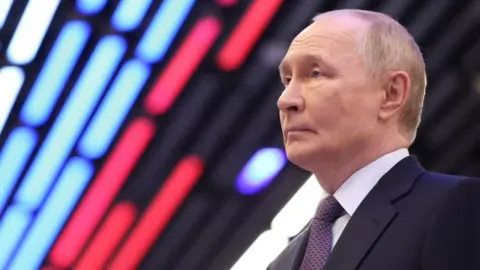 SPUTNIK/KREMLIN POOL/EPA/Shutterstock
SPUTNIK/KREMLIN POOL/EPA/ShutterstockThe audience applauded again when the Kremlin leader suggested that he would be prepared to meet Ukraine's President Volodymyr Zelensky - but only on home soil.
"The best place for this is the Russian capital, in Hero City Moscow," said Putin.
Outside Russia, Putin's proposal has been dismissed as unserious, a complete non-starter. A case of political trolling.
But in many ways it encapsulates the Kremlin's current position on the war in Ukraine: "Yes, we want peace, but only on our terms. You reject our terms? No peace then."
This uncompromising stance is being fuelled by a combination of factors.
First, by the Kremlin's belief that, in Ukraine, Russian forces have the initiative on the battlefield.
Second, by diplomatic success. In China this week, Putin shook hands and shared smiles with a string of world leaders. The optics were all about demonstrating that Russia has powerful friends, such as China, India and North Korea.
And then there's America. Last month US President Donald Trump invited Putin to Alaska for a summit meeting. Back home pro-Kremlin commentators hailed the event as evidence that Western efforts to isolate Russia over the war in Ukraine had failed.
To convince the Kremlin to end the fighting Trump has previously set ultimatums and deadlines; he's threatened further sanctions if Russia won't make peace.
But Trump hasn't followed through on his threats - and that's another reason for Russia's confidence.
Putin publicly praises Trump's peace efforts. And yet he has rejected Trump's ceasefire proposals and shown no desire to make concessions over the war in Ukraine.
So where does that leave prospects for peace?
Putin said recently that he could see "light at the end of the tunnel".
It seems to me that right now Russia on the one hand, and Ukraine and Europe (and to some extent America) on the other are in different tunnels, on different roads, with different destinations.
Ukraine and Europe are focused on ending the fighting, shaping security guarantees for Kyiv and making sure that the Ukrainian army is strong enough post-war to prevent another invasion.
When Putin talks about "light at the end of the tunnel", I believe he imagines a path that leads to a Russian victory in Ukraine, and more widely, to the construction of a new global order that benefits Russia.
In terms of peace, it's hard to see where and when these two very different highways will converge.

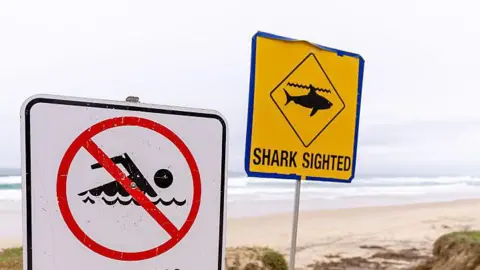 Getty Images
Getty ImagesA man has died on a Sydney beach after being bitten by a suspected "large shark", Australia's New South Wales police have said.
In a statement, the police said emergency services pulled the man out of the morning surf onto the shore at Long Reef Beach - but he "died at the scene".
"Two sections of a surfboard have been recovered and taken for expert examination," the statement read.
Saturday's incident has resulted in a string of closures in the popular area known as the Northern Beaches.
The state police said the emergency services acted after receiving reports shortly after 10:00am local time on Saturday (00:00 GMT) that "a man had suffered critical injuries".
The victim's identity was yet to be confirmed.
Local police officers and experts would work together to "determine the species of shark involved".
The last deadly shark attack in the Sydney area in 2022, when Simon Nellist - a British diving instructor - was mauled by a great white shark.
Prior to that, there had not been a fatal attack since 1963.
Australia typically records about 20 shark attacks each year, with most in New South Wales and Western Australia.
Historically, dying from a shark bite is uncommon. In over a century of records, Australia's shark attack mortality rate is 0.9 - less than one person per year.
中国零售业景气指数在9月升至今年1月以来的新高。
中国商业联合会星期六(9月6日)公布,中国零售业景气指数(CRPI)从8月份的50.1,升至9月份的为50.6,创近八个月新高。今年1月份的指数为51.1。
从行业分类来看,商品经营类指数为50.6,上升0.9;租赁经营类指数为51.4%,下降0.7;电商经营类指数为50.2,上升0.4。
央视新闻报道,分析表明,随着中国各地以旧换新补贴政策调整更新,以及开学季的来临,商品消费需求继续回升,零售企业积极备货,盈利信心显著增强,行业发展趋势明显向好。